

Sisyphus or “Sissy Puss”? – Deep Brain Diary. An Apt Metaphor?
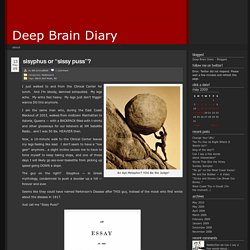
YOU Be the Judge! I just walked to and from the Clinical Center for lunch. And I’m bloody, damned exhausted. My legs ache. My arms feel heavy. I am the same man who, during the East Coast Blackout of 2003, walked from midtown Manhattan to Astoria, Queens — with a BACKPACK filled with t-shirts and other giveaways for our listeners at XM Satellite Radio… and I was 50 lbs. Now, a 10-minute walk to the Clinical Center leaves my legs feeling like lead. The guy on the right? Seems like they could have named Parkinson’s Disease after THIS guy, instead of the mook who first wrote about the disease in 1817.
Just call me “Sissy Puss!” Marquis de Condorcet. Marie Jean Antoine Nicolas de Caritat, Marquis of Condorcet (French: [maʁi ʒɑ̃n‿ɑ̃twan nikola də kaʁita kɔ̃dɔʁsɛ]; 17 September 1743 – 29 March 1794), known as Nicolas de Condorcet, was a French philosopher and mathematician.
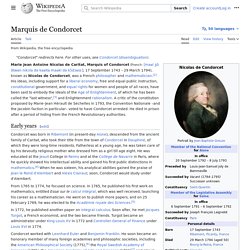
His ideas, including support for a liberal economy, free and equal public instruction, constitutional government, and equal rights for women and people of all races, have been said to embody the ideals of the Age of Enlightenment and Enlightenment rationalism. He died in prison after a period of flight from French Revolutionary authorities. Early years[edit] Condorcet was born in Ribemont (in present-day Aisne), descended from the ancient family of Caritat, who took their title from the town of Condorcet in Dauphiné, of which they were long-time residents. Fatherless at a young age, he was raised by his devoutly religious mother.
From 1765 to 1774, he focused on science. 9780521871389 frontmatter (1) Bishop of basel. Sabbatarianism. Non-Sabbatarianism is the view opposing all Sabbatarianism, declaring Christians to be free of mandates to follow such specific observances.
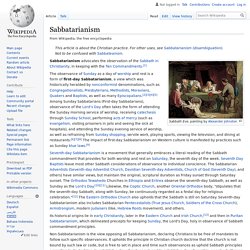
It upholds the principle in Christian church doctrine that the church is not bound by such law or code, but is free to set in place and time such observances as uphold Sabbath principles according to its doctrine: to establish a day of rest, or not, and to establish a day of worship, or not, whether on Saturday or on Sunday or on some other day. It includes all Roman Catholics, some Orthodox, and some Protestant denominations. History[edit] We are taught by Christ, that the doing of alms and showing of mercy are proper works for the Sabbath-day.
When the Pharisees found fault with Christ for suffering his disciples to pluck the ears of corn, and eat on the Sabbath, Christ corrects them with that saying, “I will have mercy and not sacrifice;” Mat. 12:7. Jewish sabbatarian superstition - Google 検索. Apollonian and Dionysian. Terms representing a dichotomy/dialectic between rationality and emotion The Apollonian and Dionysian is a philosophical and literary concept and dichotomy/dialectic, based on Apollo and Dionysus in Greek mythology.
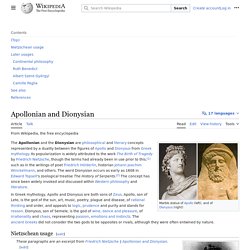
Dionysus. Ancient Greek god of winemaking and wine Dionysus or Dionysos[a] is the god of the grape-harvest, winemaking and wine, of fertility, ritual madness, religious ecstasy, and theatre in ancient Greek religion and myth.[2][3] He is also known as Bacchus ( or ; Greek: Βάκχος, Bákkhos), the name adopted by the Romans;[4] the frenzy he induces is bakkheia.
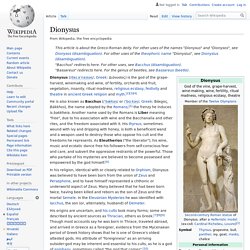
His thyrsus, sometimes wound with ivy and dripping with honey, is both a beneficent wand and a weapon used to destroy those who oppose his cult and the freedoms he represents. Duality of time in platinis schopenhauer. Plotinus. Biography[edit] Plotinus had an inherent distrust of materiality (an attitude common to Platonism), holding to the view that phenomena were a poor image or mimicry (mimesis) of something "higher and intelligible" [VI.I] which was the "truer part of genuine Being".
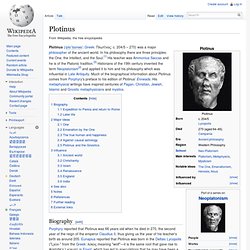
This distrust extended to the body, including his own; it is reported by Porphyry that at one point he refused to have his portrait painted, presumably for much the same reasons of dislike. Parerga and Paralipomena by Arthur Schopenhauer. SELECTIONS from PARERGA AND PARALIPOMENA VOLUME 2 - Ukemi Audiobooks. SELECTIONS from PARERGA AND PARALIPOMENA VOLUME 2.

Plotinus. PLOTINUS Ennead VI.4 & VI.5: On the Presence of Being, One and the Same ... - Eyjolfur Strange Emilsson, Steven. On Intelligible Beauty - Plotinus. Numenius. Amelius. Amelius (/əˈmiːliəs/; Greek: Ἀμέλιος), whose family name was Gentilianus, was a Neoplatonist philosopher and writer of the second half of the 3rd century.
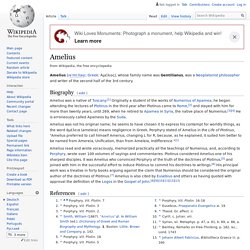
Biography[edit] Amelius was not his original name; he seems to have chosen it to express his contempt for worldly things, as the word ἀμέλεια (ameleia) means negligence in Greek. Porphyry stated of Amelius in the Life of Plotinus, "Amelius preferred to call himself Amerius, changing L for R, because, as he explained, it suited him better to be named from Amereia, Unification, than from Ameleia, Indifference.
"[1] Lucius Aemilius Paullus Macedonicus. 2nd-century BC Roman consul and general Lucius Aemilius Paullus Macedonicus (c. 229 BC – 160 BC) was a two-time consul of the Roman Republic and a noted general who conquered Macedon, putting an end to the Antigonid dynasty in the Third Macedonian War.
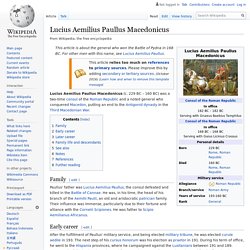
Family[edit] Early career[edit] Eutocius of Ascalon. Eutocius of Ascalon (/juːˈtoʊʃəs/; Greek: Εὐτόκιος ὁ Ἀσκαλωνίτης; c. 480 – c. 540) was a Greek mathematician who wrote commentaries on several Archimedean treatises and on the Apollonian Conics.
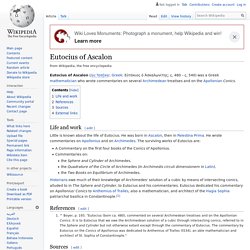
Life and work[edit] Little is known about the life of Eutocius. Eutocius of Ascalon. FANDOM powered by Wikia. Atlantis (in Greek, Ἀτλαντὶς νῆσος, "island of Atlas") is the name of a legendary island first mentioned in Plato's dialogues Timaeus and Critias. In Plato's account, Atlantis, lying "beyond the pillars of Heracles", was a naval power that conquered many parts of Western Europe and Africa 9,000 years before the time of Solon, or approximately 9500 BC.
After a failed attempt to invade Athens, Atlantis sank into the ocean "in a single day and night of misfortune". As a story embedded in Plato's dialogues, Atlantis is generally seen as a myth created by Plato to illustrate his political theories. Although the function of the story of Atlantis seems clear to most scholars, they dispute whether and how much Plato's account was inspired by older traditions. The possible existence of a genuine Atlantis was actively discussed throughout classical antiquity, but it was usually rejected and occasionally parodied.
Plato's Account Edit. La ratinus - Google-Suche. Amphion and Zethus. Mythology[edit] Childhood[edit] Dirce's punishment - Roman wall painting in House of the Vettii, Pompeii. Antiope eventually escaped and found her sons living near Mount Cithaeron. After they were convinced that she was their mother, they killed Dirce by tying her to the horns of a bull, gathered an army, and conquered Thebes, becoming its joint rulers.[3] They also either killed Lycus or forced him to give up his throne. [4]
Empedoclis Agrigentini Carminum Reliquiae - Empedocles, Simon Karsten. Anaxagoras - Google 検索. Privation. Privation is the absence or lack of basic necessities.[1] Child psychology[edit] In child psychology, privation occurs when a child has no opportunity to form a relationship with a parent figure, or when such relationship is distorted, due to their treatment.[2] It is different to deprivation, which occurs when an established relationship is severed.[3] It is understood that privation can produce social, emotional and intellectual problems for children; however, how inevitable such problems become as a result of privation, and the extent to which they can be reversed, remains an issue of debate among psychologists.[4] Philosophy[edit] In philosophy, privation may refer to the absence of a necessary quality in the universe.
[citation needed][5] Definition of Substratum by Merriam-Webster. Books from the library of Ementy - Google 検索. The secret oral teachings. The Secret Oral Teachings in Tibetan Buddhist Sects - Alexandra David-Neel, Michael Lally. Alexandra David-N el - Recherche Google. Archimedes. Apollonius of Tyana. Apollonius of Tyana (Ancient Greek: Ἀπολλώνιος ὁ Τυανεύς; c. 15 – c. 100 AD),[1] sometimes also called Apollonios of Tyana, was a Greek Neopythagorean philosopher from the town of Tyana in the Roman province of Cappadocia in Anatolia. Life dates[edit] Apollonius was born into a respected and wealthy Greek family.[2][3] Although the precise dates of his birth and death are uncertain, most scholars agree that he was a contemporary of Jesus of Nazareth. His primary biographer, Philostratus the Elder (circa 170 – c. 247), places him circa 3 BC – c. 97 AD.[1][4] A wandering philosopher, probably representing Apollonius of Tyana, who lived a part of his life in Crete and died there.
Found in Gortyn (late 2nd century AD), now in Heraklion Archaeological Museum, Crete. Pappus of Alexandria. Title page of Pappus's Mathematicae Collectiones, translated into Latin by Federico Commandino (1589). Pappus of Alexandria (/ˈpæpəs/; Greek: Πάππος ὁ Ἀλεξανδρεύς; c. 290 – c. 350) was one of the last great Greek mathematicians of Antiquity, known for his Synagoge (Συναγωγή) or Collection (c. 340), and for Pappus's hexagon theorem in projective geometry. Grigori Rasputin. Russian mystic Grigori Yefimovich Rasputin (/ræˈspjuːtɪn/;[1] Russian: Григо́рий Ефи́мович Распу́тин [ɡrʲɪˈɡorʲɪj jɪˈfʲiməvʲɪtɕ rɐˈsputʲɪn]; 21 January [O.S. 9 January] 1869 – 30 December [O.S. 17 December] 1916) was a Russian mystic and self-proclaimed holy man who befriended the family of Tsar Nicholas II, the last monarch of Russia, and gained considerable influence in late imperial Russia.
Born to a peasant family in the Siberian village of Pokrovskoye, Tobolsk governorate (now Tyumen oblast), Rasputin had a religious conversion experience after taking a pilgrimage to a monastery in 1897. Shabad sakhi book. Yudhishthira. Character from Indian epic Mahabharata. Schelling. System of Transcendental Idealism. System of Transcendental Idealism (1800) - Friedrich Wilhelm Joseph von Schelling. Ages of the World, The - Friedrich Wilhelm Joseph Von Schelling. Schelling, F. W. J. von. F. W. J. von Schelling is one of the great German philosophers of the late 18th and early 19th Century. Some historians and scholars of philosophy have classified him as a German Idealist, along with J. G. Fichte and G. The real importance of Schelling’s later works lies in the exposure of the dominant systemic metaphysics of the Subject to its limit rather than in its confirmation.
This is because it is perceived that the task of philosophical thinking is no longer the foundational act of the systematic metaphysics of the Subject. Of Human Freedom Friedrich Wilhelm Joseph Schelling. Leibniz Theodicy chapter 62-63. Theodicy. Theological attempt to resolve the problem of evil Gottfried Leibniz coined the term "theodicy" in an attempt to justify God's existence in light of the apparent imperfections of the world. Leibniz on the Problem of Evil. 1. Project Gutenberg - Google 検索. Spinoza second part of his ethics. Theodicy leibniz - Google-Suche. Bell, schopenhauer and leibniz - Google-Suche. Charles Bell. Sir Charles Bell KH FRS FRSE FRCSE MWS (12 November 1774 – 28 April 1842) was a Scottish surgeon, anatomist, physiologist, neurologist, artist, and philosophical theologian.
He is noted for discovering the difference between sensory nerves and motor nerves in the spinal cord. He is also noted for describing Bell's palsy. On the Fourfold Root of the Principle of Sufficient Reason. Translated by Mme. KARL HILLEBRAND. Parerga and Paralipomena: A Collection of Philosophical Essays - Arthur Schopenhauer. Nicolas Malebranche. Nicolas Malebranche, Oratory of Jesus (; French: [nikɔlɑ malbrɑ̃ʃ]; 6 August 1638 – 13 October 1715), was a French Oratorian[1] priest and rationalist philosopher. In his works, he sought to synthesize the thought of St. Pre-established harmony. Overview[edit] Friedrich Wilhelm Joseph Schelling. Johann Gottlieb Fichte. Fichte's Conception of God. The Difference Between Fichte's and Schelling's System of Philosophy by Hegel 1801. Four Phenomenological Philosophers: Husserl, Heidegger, Sartre, Merleau-Ponty - Christopher Macann - Google Books.
Edmund Husserl. Martin Heidegger. Jean-Paul Sartre. Maurice Merleau-Ponty. Kosiko symphonic youtube - Google-Suche. Conversations on the Plurality of Worlds. Jean de La Bruyère. The history of the Church and Empire by Le Sueur - Google 検索. Michelle's treatment of pangs of conscious reference from nietzsche. Pralaya. Pralaya - Theosophy Wiki. Definition of Pralaya by Merriam-Webster. Maha Pralaya. Definition of Complex by Merriam-Webster. Tabula rasa. Theosophy. Three Dialogues between Hylas and Philonous. Nicolas Malebranche. Definition of Bigot by Merriam-Webster. Definition of Postmortem by Merriam-Webster. Purusha and pariah - Cerca con Google.
Longman World History. Gustav Fechner. Gaia mother of the earth comes from india. JS Bach named as the Greatest Composer of All Time by today’s leading composers - Pianist. Soprano-crusher « parterre box - "The most essential blog in opera!" (New York Times) Where opera is king and you, the readers, are queens.
Definition in the Cambridge English Dictionary. Definition of Steamroller by Merriam-Webster. Johann Georg Ritter von Zimmermann. Phaedo. Phaedo. Christian Wolff. Christian Wolff. The Basis of Morality - Arthur Schopenhauer. Jacques Lacan. Jakob Böhme. Der blaue Engel - Recherche Google. Harvey and simulvice - Recherche Google. Harvey and simulvice - Recherche Google. St ronan's well.